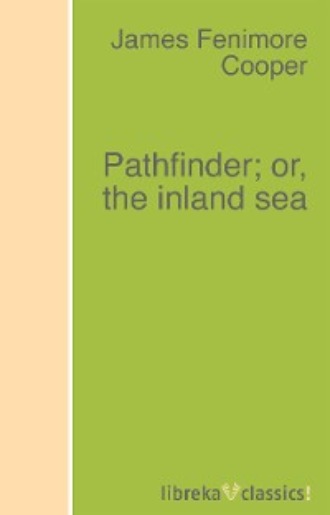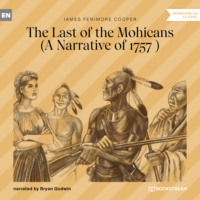
Полная версия
Pathfinder; or, the inland sea

Titel: Pathfinder; or, the inland sea
von William Shakespeare, H. G. Wells, Henry Van Dyke, Thomas Carlyle, Oscar Wilde, Joseph Conrad, Henry James, Anthony Hope, Henry Fielding, Giraldus Cambrensis, Daniel Defoe, Grammaticus Saxo, Edgar Rice Burroughs, Hugh Lofting, Agatha Christie, Sinclair Lewis, Eugène Brieux, Upton Sinclair, Booth Tarkington, Sax Rohmer, Jack London, Anna Katharine Green, Sara Jeannette Duncan, Xenophon, Alexandre Dumas père, John William Draper, Alice Christiana Thompson Meynell, Bram Stoker, Honoré de Balzac, William Congreve, Louis de Rougemont, Nikolai Vasilievich Gogol, Rolf Boldrewood, François Rabelais, Lysander Spooner, B. M. Bower, Henry Rider Haggard, William Hickling Prescott, Lafcadio Hearn, Robert Herrick, Jane Austen, Mark Twain, Mary Roberts Rinehart, Charles Babbage, Kate Douglas Smith Wiggin, Frank L. Packard, George Meredith, John Merle Coulter, Irvin S. Cobb, Edwin Mims, John Tyndall, Various, Charles Darwin, Sidney Lanier, Henry Lawson, Niccolò Machiavelli, George W. Crile, Théophile Gautier, Noah Brooks, James Thomson, Zane Grey, J. M. Synge, Virginia Woolf, Conrad Aiken, Edna St. Vincent Millay, Helen Cody Wetmore, Ayn Rand, Sir Thomas Malory, Gustave Flaubert, Edmond Rostand, Charlotte Brontë, Edith Wharton, Giles Lytton Strachey, Myrtle Reed, Ernest Bramah, Jules Verne, H. L. Mencken, H. Stanley Redgrove, Victor Lefebure, Edna Lyall, John Masefield, Charles Kingsley, Robert Burns, Edgar Lee Masters, Victor [pseud.] Appleton, Ellis Parker Butler, Mary Lamb, Charles Lamb, Johann Wolfgang von Goethe, Kenneth Grahame, Charles Dickens, John Ruskin, John Galt, James J. Davis, Owen Wister, William Blades, Sir Hall Caine, Sir Max Beerbohm, Baron Edward John Moreton Drax Plunkett Dunsany, Bret Harte, E. Phillips Oppenheim, Thomas Henry Huxley, A. B. Paterson, John N. Reynolds, Walter Dill Scott, Hans Gustav Adolf Gross, T. S. Eliot, Walt Whitman, Arthur Ransome, Jane Addams, Elizabeth, David Lindsay, Helen Bannerman, Charles A. Oliver, J. M. Barrie, Robert F. Murray, Andrew Lang, Jerome K. Jerome, Francis Thompson, Sydney Waterlow, Andrew Dickson White, Benjamin N. Cardozo, Karl Marx, Edouard Louis Emmanuel Julien Le Roy, Margaret Hill McCarter, Sir Donald Mackenzie Wallace, Howard Trueman, L. M. Montgomery, Frank T. Bullen, Baron Alfred Tennyson Tennyson, Jonathan Nield, Henry Wadsworth Longfellow, Charles Reade, Ouida, Washington Irving, Benjamin Louis Eulalie de Bonneville, Sir Walter Scott, Stewart Edward White, Arthur Hugh Clough, Baron Edward Bulwer Lytton Lytton, C.-F. Volney, T. Troward, graf Leo Tolstoy, Christopher Morley, James Madison, Alexander Hamilton, John Jay, Gilbert White, Percival Lowell, Frederick Marryat, Robert Graves, Thomas Holmes, Wilkie Collins, Maria Edgeworth, Katherine Mansfield, E. Nesbit, Olive Schreiner, Jeronimo Lobo, O. Henry, James Slough Zerbe, Donald Ogden Stewart, Johanna Spyri, Eleanor H. Porter, William Tatem Tilden, Sol Plaatje, Rafael Sabatini, William Makepeace Thackeray, George Gissing, Maksim Gorky, Baron Thomas Babington Macaulay Macaulay, H. G. Keene, Saki, R. B. Cunninghame Graham, Thomas Hughes, David Nunes Carvalho, Vicente Blasco Ibáñez, Carry Amelia Nation, John Fiske, Bernard Shaw, Elbridge Streeter Brooks, William Holmes McGuffey, Edward Everett Hale, Louis Ginzberg, Chester K. Steele, Christopher Marlowe, Plato, John Lord, Shakespeare, Martin Luther, Frances Hodgson Burnett, Howard Pyle, Charles Morris, Edward Carpenter, Maurice Leblanc, James Boswell, William Osler, William Ernest Henley, Theron Q. Dumont, Horatio Alger, Abraham Myerson, Joel Benton, Eden Phillpotts, Anonymous, Robert Louis Stevenson, Lloyd Osbourne, Cleland Boyd McAfee, Robert Williams Wood, H. C. Andersen, Edna Ferber, James Stephens, John Jacob Astor, Alexandre Dumas fils, Hilda Conkling, J. Storer Clouston, Julian Hawthorne, Ernest Albert Savage, Mary Eleanor Wilkins Freeman, Fernando de Rojas, Richard Harding Davis, Charles Whibley, Thomas Dixon, Sir Arthur Conan Doyle, George MacDonald, Thomas H. Burgoyne, Belle M. Wagner, Émile Gaboriau, à Kempis Thomas, United States. Central Intelligence Agency, Herbert Darling Foster, John Chipman Farrar, Lucius Apuleius, Olive Gilbert, Sojourner Truth, Arthur Judson Brown, Burbank L. Todd, Gaston Leroux, Margaret Sanger, Jr. Martin Luther King, Mary Johnston, S. A. Reilly, G. K. Chesterton, Elizabeth Cleghorn Gaskell, George Iles, E. W. Hornung, Edward Huntington Williams, Henry Smith Williams, Nathaniel W. Stephenson, Ellen Marriage, Homer, Anton Pavlovich Chekhov, J. F. C. Hecker, John Milton, Natalie Sumner Lincoln, Baroness Emmuska Orczy Orczy, Thomas Bailey Aldrich, Mary Esther Miller MacGregor, William MacLeod Raine, Earl Derr Biggers, Helen Nicolay, Ruth Ogden, Thornton W. Burgess, Mary Murdoch Mason, Auguste Groner, John Lawson, Emma Wolf, Theodore Dreiser, Roger Ascham, John Charles McNeill, Owen Meredith, L. Adams Beck, Rudyard Kipling, Alphonse Daudet, Theodore Roosevelt, Henry Cabot Lodge, Anthony Trollope, A. A. Milne, Elia Wilkinson Peattie, J. Fitzgerald Molloy, James Fenimore Cooper
ISBN 978-3-7429-1819-2
Alle Rechte vorbehalten.
Es ist ohne vorherige schriftliche Erlaubnis nicht gestattet, dieses Werk im Ganzen oder in Teilen zu vervielfältigen oder zu veröffentlichen.
THE PATHFINDER
or, THE INLAND SEA
By James Fenimore Cooper
Contents
PREFACE. THE PATHFINDER.
CHAPTER I. CHAPTER II. CHAPTER III. CHAPTER IV CHAPTER V CHAPTER VI. CHAPTER VII. CHAPTER VIII. CHAPTER IX. CHAPTER X. CHAPTER XI. CHAPTER XII. CHAPTER XIII. CHAPTER XIV. CHAPTER XV. CHAPTER XVI. CHAPTER XVII. CHAPTER XVIII. CHAPTER XIX. CHAPTER XX. CHAPTER XXI. CHAPTER XXII. CHAPTER XXIII. CHAPTER XXIV. CHAPTER XXV. CHAPTER XXVI. CHAPTER XXVII. CHAPTER XXVIII. CHAPTER XXIX. CHAPTER XXX.
PREFACE.
The plan of this tale suggested itself to the writer many years since, though the details are altogether of recent invention. The idea of associating seamen and savages in incidents that might be supposed characteristic of the Great Lakes having been mentioned to a Publisher, the latter obtained something like a pledge from the Author to carry out the design at some future day, which pledge is now tardily and imperfectly redeemed.
The reader may recognize an old friend under new circumstances in the principal character of this legend. If the exhibition made of this old acquaintance, in the novel circumstances in which he now appears, should be found not to lessen his favor with the Public, it will be a source of extreme gratification to the writer, since he has an interest in the individual in question that falls little short of reality. It is not an easy task, however, to introduce the same character in four separate works, and to maintain the peculiarities that are indispensable to identity, without incurring a risk of fatiguing the reader with sameness; and the present experiment has been so long delayed quite as much from doubts of its success as from any other cause. In this, as in every other undertaking, it must be the "end" that will "crown the work."
The Indian character has so little variety, that it has been my object to avoid dwelling on it too much on the present occasion; its association with the sailor, too, it is feared, will be found to have more novelty than interest.
It may strike the novice as an anachronism to place vessels on the Ontario in the middle of the eighteenth century; but in this particular facts will fully bear out all the license of the fiction. Although the precise vessels mentioned in these pages may never have existed on that water or anywhere else, others so nearly resembling them are known to have navigated that inland sea, even at a period much earlier than the one just mentioned, as to form a sufficient authority for their introduction into a work of fiction. It is a fact not generally remembered, however well known it may be, that there are isolated spots along the line of the great lakes that date as settlements as far back as many of the older American towns, and which were the seats of a species of civilization long before the greater portion of even the older States was rescued from the wilderness.
Ontario in our own times has been the scene of important naval evolutions. Fleets have manoeuvered on those waters, which, half a century ago, were as deserted as waters well can be; and the day is not distant when the whole of that vast range of lakes will become the seat of empire, and fraught with all the interests of human society. A passing glimpse, even though it be in a work of fiction, of what that vast region so lately was, may help to make up the sum of knowledge by which alone a just appreciation can be formed of the wonderful means by which Providence is clearing the way for the advancement of civilization across the whole American continent.
THE PATHFINDER.
CHAPTER I.
The sublimity connected with vastness is familiar to every eye. The most abstruse, the most far-reaching, perhaps the most chastened of the poet's thoughts, crowd on the imagination as he gazes into the depths of the illimitable void. The expanse of the ocean is seldom seen by the novice with indifference; and the mind, even in the obscurity of night, finds a parallel to that grandeur, which seems inseparable from images that the senses cannot compass. With feelings akin to this admiration and awe—the offspring of sublimity—were the different characters with which the action of this tale must open, gazing on the scene before them. Four persons in all,—two of each sex,—they had managed to ascend a pile of trees, that had been uptorn by a tempest, to catch a view of the objects that surrounded them. It is still the practice of the country to call these spots wind-rows. By letting in the light of heaven upon the dark and damp recesses of the wood, they form a sort of oases in the solemn obscurity of the virgin forests of America. The particular wind-row of which we are writing lay on the brow of a gentle acclivity; and, though small, it had opened the way for an extensive view to those who might occupy its upper margin, a rare occurrence to the traveller in the woods. Philosophy has not yet determined the nature of the power that so often lays desolate spots of this description; some ascribing it to the whirlwinds which produce waterspouts on the ocean, while others again impute it to sudden and violent passages of streams of the electric fluid; but the effects in the woods are familiar to all. On the upper margin of the opening, the viewless influence had piled tree on tree, in such a manner as had not only enabled the two males of the party to ascend to an elevation of some thirty feet above the level of the earth, but, with a little care and encouragement, to induce their more timid companions to accompany them. The vast trunks which had been broken and driven by the force of the gust lay blended like jack-straws; while their branches, still exhaling the fragrance of withering leaves, were interlaced in a manner to afford sufficient support to the hands. One tree had been completely uprooted, and its lower end, filled with earth, had been cast uppermost, in a way to supply a sort of staging for the four adventurers, when they had gained the desired distance from the ground.
The reader is to anticipate none of the appliances of people of condition in the description of the personal appearances of the group in question. They were all wayfarers in the wilderness; and had they not been, neither their previous habits, nor their actual social positions, would have accustomed them to many of the luxuries of rank. Two of the party, indeed, a male and female, belonged to the native owners of the soil, being Indians of the well-known tribe of the Tuscaroras; while their companions were—a man, who bore about him the peculiarities of one who had passed his days on the ocean, and was, too, in a station little, if any, above that of a common mariner; and his female associate, who was a maiden of a class in no great degree superior to his own; though her youth, sweetness and countenance, and a modest, but spirited mien, lent that character of intellect and refinement which adds so much to the charm of beauty in the sex. On the present occasion, her full blue eye reflected the feeling of sublimity that the scene excited, and her pleasant face was beaming with the pensive expression with which all deep emotions, even though they bring the most grateful pleasure, shadow the countenances of the ingenuous and thoughtful.
And truly the scene was of a nature deeply to impress the imagination of the beholder. Towards the west, in which direction the faces of the party were turned, the eye ranged over an ocean of leaves, glorious and rich in the varied and lively verdure of a generous vegetation, and shaded by the luxuriant tints which belong to the forty-second degree of latitude. The elm with its graceful and weeping top, the rich varieties of the maple, most of the noble oaks of the American forest, with the broad-leaved linden known in the parlance of the country as the basswood, mingled their uppermost branches, forming one broad and seemingly interminable carpet of foliage which stretched away towards the setting sun, until it bounded the horizon, by blending with the clouds, as the waves and the sky meet at the base of the vault of heaven. Here and there, by some accident of the tempests, or by a caprice of nature, a trifling opening among these giant members of the forest permitted an inferior tree to struggle upward toward the light, and to lift its modest head nearly to a level with the surrounding surface of verdure. Of this class were the birch, a tree of some account in regions less favored, the quivering aspen, various generous nut-woods, and divers others which resembled the ignoble and vulgar, thrown by circumstances into the presence of the stately and great. Here and there, too, the tall straight trunk of the pine pierced the vast field, rising high above it, like some grand monument reared by art on a plain of leaves.
It was the vastness of the view, the nearly unbroken surface of verdure, that contained the principle of grandeur. The beauty was to be traced in the delicate tints, relieved by graduations of light and shade; while the solemn repose induced the feeling allied to awe.
"Uncle," said the wondering, but pleased girl, addressing her male companion, whose arm she rather touched than leaned on, to steady her own light but firm footing, "this is like a view of the ocean you so much love!"
"So much for ignorance, and a girl's fancy, Magnet,"—a term of affection the sailor often used in allusion to his niece's personal attractions; "no one but a child would think of likening this handful of leaves to a look at the real Atlantic. You might seize all these tree-tops to Neptune's jacket, and they would make no more than a nosegay for his bosom."
"More fanciful than true, I think, uncle. Look thither; it must be miles on miles, and yet we see nothing but leaves! what could one behold, if looking at the ocean?"
"More!" returned the uncle, giving an impatient gesture with the elbow the other touched, for his arms were crossed, and the hands were thrust into the bosom of a vest of red cloth, a fashion of the times,—"more, Magnet! say, rather, what less? Where are your combing seas, your blue water, your rollers, your breakers, your whales, or your waterspouts, and your endless motion, in this bit of a forest, child?"
"And where are your tree-tops, your solemn silence, your fragrant leaves, and your beautiful green, uncle, on the ocean?"
"Tut, Magnet! if you understood the thing, you would know that green water is a sailor's bane. He scarcely relishes a greenhorn less."
"But green trees are a different thing. Hist! that sound is the air breathing among the leaves!"
"You should hear a nor-wester breathe, girl, if you fancy wind aloft. Now, where are your gales, and hurricanes, and trades, and levanters, and such like incidents, in this bit of a forest? And what fishes have you swimming beneath yonder tame surface?"
"That there have been tempests here, these signs around us plainly show; and beasts, if not fishes, are beneath those leaves."
"I do not know that," returned the uncle, with a sailor's dogmatism. "They told us many stories at Albany of the wild animals we should fall in with, and yet we have seen nothing to frighten a seal. I doubt if any of your inland animals will compare with a low latitude shark."
"See!" exclaimed the niece, who was more occupied with the sublimity and beauty of the "boundless wood" than with her uncle's arguments; "yonder is a smoke curling over the tops of the trees—can it come from a house?"
"Ay, ay; there is a look of humanity in that smoke," returned the old seaman, "which is worth a thousand trees. I must show it to Arrowhead, who may be running past a port without knowing it. It is probable there is a caboose where there is a smoke."
As he concluded, the uncle drew a hand from his bosom, touched the male Indian, who was standing near him, lightly on the shoulder, and pointed out a thin line of vapor which was stealing slowly out of the wilderness of leaves, at a distance of about a mile, and was diffusing itself in almost imperceptible threads of humidity in the quivering atmosphere. The Tuscarora was one of those noble-looking warriors oftener met with among the aborigines of this continent a century since than to-day; and, while he had mingled sufficiently with the colonists to be familiar with their habits and even with their language, he had lost little, if any, of the wild grandeur and simple dignity of a chief. Between him and the old seaman the intercourse had been friendly, but distant; for the Indian had been too much accustomed to mingle with the officers of the different military posts he had frequented not to understand that his present companion was only a subordinate. So imposing, indeed, had been the quiet superiority of the Tuscarora's reserve, that Charles Cap, for so was the seaman named, in his most dogmatical or facetious moments, had not ventured on familiarity in an intercourse which had now lasted more than a week. The sight of the curling smoke, however, had struck the latter like the sudden appearance of a sail at sea; and, for the first time since they met, he ventured to touch the warrior, as has been related.
The quick eye of the Tuscarora instantly caught a sight of the smoke; and for full a minute he stood, slightly raised on tiptoe, with distended nostrils, like the buck that scents a taint in the air, and a gaze as riveted as that of the trained pointer while he waits his master's aim. Then, falling back on his feet, a low exclamation, in the soft tones that form so singular a contrast to its harsher cries in the Indian warrior's voice, was barely audible; otherwise, he was undisturbed. His countenance was calm, and his quick, dark, eagle eye moved over the leafy panorama, as if to take in at a glance every circumstance that might enlighten his mind. That the long journey they had attempted to make through a broad belt of wilderness was necessarily attended with danger, both uncle and niece well knew; though neither could at once determine whether the sign that others were in their vicinity was the harbinger of good or evil.
"There must be Oneidas or Tuscaroras near us, Arrowhead," said Cap, addressing his Indian companion by his conventional English name; "will it not be well to join company with them, and get a comfortable berth for the night in their wigwam?"
"No wigwam there," Arrowhead answered in his unmoved manner—"too much tree."
"But Indians must be there; perhaps some old mess-mates of your own, Master Arrowhead."
"No Tuscarora—no Oneida—no Mohawk—pale-face fire."
"The devil it is? Well, Magnet, this surpasses a seaman's philosophy: we old sea-dogs can tell a lubber's nest from a mate's hammock; but I do not think the oldest admiral in his Majesty's fleet can tell a king's smoke from a collier's."
The idea that human beings were in their vicinity, in that ocean of wilderness, had deepened the flush on the blooming cheek and brightened the eye of the fair creature at his side; but she soon turned with a look of surprise to her relative, and said hesitatingly, for both had often admired the Tuscarora's knowledge, or, we might almost say, instinct,—
"A pale-face's fire! Surely, uncle, he cannot know that?"
"Ten days since, child, I would have sworn to it; but now I hardly know what to believe. May I take the liberty of asking, Arrowhead, why you fancy that smoke, now, a pale-face's smoke, and not a red-skin's?"
"Wet wood," returned the warrior, with the calmness with which the pedagogue might point out an arithmetical demonstration to his puzzled pupil. "Much wet—much smoke; much water—black smoke."
"But, begging your pardon, Master Arrowhead, the smoke is not black, nor is there much of it. To my eye, now, it is as light and fanciful a smoke as ever rose from a captain's tea-kettle, when nothing was left to make the fire but a few chips from the dunnage."
"Too much water," returned Arrowhead, with a slight nod of the head; "Tuscarora too cunning to make fire with water! Pale-face too much book, and burn anything; much book, little know."
"Well, that's reasonable, I allow," said Cap, who was no devotee of learning: "he means that as a hit at your reading, Magnet; for the chief has sensible notions of things in his own way. How far, now, Arrowhead, do you make us, by your calculation, from the bit of a pond that you call the Great Lake, and towards which we have been so many days shaping our course?"
The Tuscarora looked at the seaman with quiet superiority as he answered, "Ontario, like heaven; one sun, and the great traveller will know it."
"Well, I have been a great traveller, I cannot deny; but of all my v'y'ges this has been the longest, the least profitable, and the farthest inland. If this body of fresh water is so nigh, Arrowhead, and so large, one might think a pair of good eyes would find it out; for apparently everything within thirty miles is to be seen from this lookout."
"Look," said Arrowhead, stretching an arm before him with quiet grace; "Ontario!"
"Uncle, you are accustomed to cry 'Land ho!' but not 'Water ho!' and you do not see it," cried the niece, laughing, as girls will laugh at their own idle conceits.
"How now, Magnet! dost suppose that I shouldn't know my native element if it were in sight?"
"But Ontario is not your native element, dear uncle; for you come from the salt water, while this is fresh."






